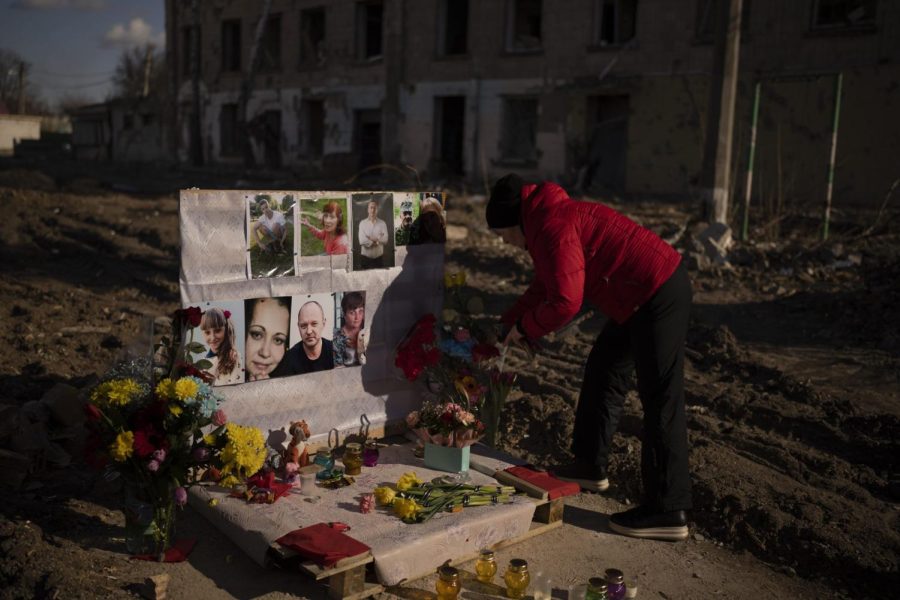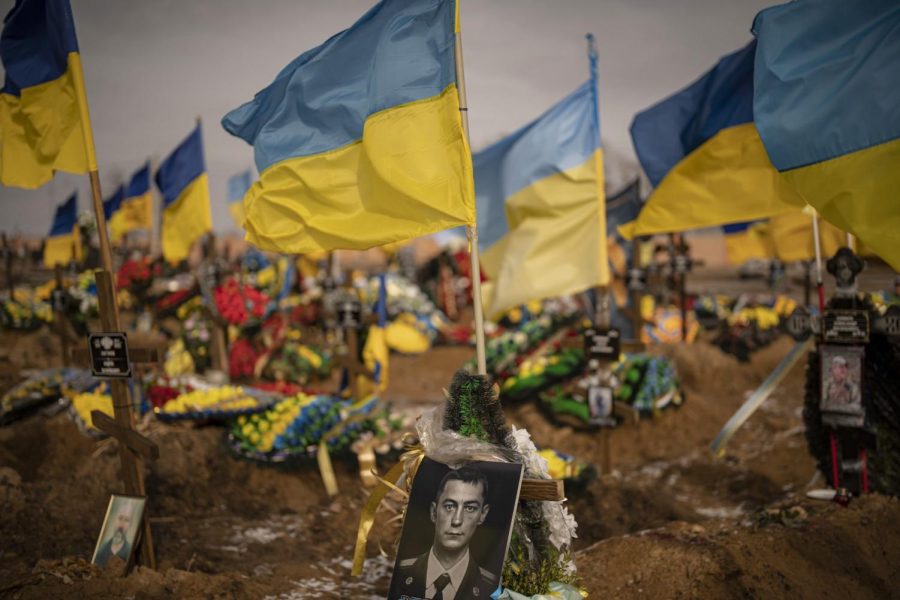One year later: War in Ukraine has global impact
Credit: Vadim Ghirda | Associated Press
A photograph of a Ukrainian serviceman adorns a grave in the Alley of Glory portion of the cemetery, in Kharkiv, Ukraine.
Russia launched an attack against Ukraine on Feb. 24, 2022, marking the start of the war in Ukraine as it has been covered in mainstream news outlets. But the true war over the Russo-Ukrainian border started in 2014.
“There’s nothing really dramatic that happened in the world that I could see that prompted this,” said David Marples, Eastern European history professor at the University of Alberta. “I mean, there’s no sort of immediate cause for it. Other than perhaps, Putin was thinking about his legacy or thinking about some new direction in Ukraine, after the operations in Syria was sort of winding down.”
Russia has been trying to annex Ukraine as a part of its own territory, since it believes that Ukraine has become a puppet of NATO and the West, according to Dick Farkas, DePaul political science professor.
“It’s like two brothers, of course, raised in the same home, then they go off to college, and one of them seizes on the opportunities and develops impressive things,” Farkas said. “The other one doesn’t quite adapt to the new environment. And then by comparison, then the contrast is dramatic, and I think the Russian leadership was beginning to understand that that was happening.”
Since Russia’s attack last year, the world has become split. Some countries support Russia and are continuing to buy Russian gas, while others are sending support and ammunition towards Ukraine. Soon after the war started, President Biden banned the import of all Russian petroleum, natural liquid gas and coal products.
“But the biggest thing about China is it’s also become an importer of the energy resources that the Europeans have turned down,” Marples said. “So most of the oil, for example, is going to China now from Russia. Of the other countries, India is very friendly to Russia as well.”
China’s government stands to benefit from this war, according to Farkas.
“I think China is very pleased with what’s happening and are very happy to see Russia decline as a player in global affairs,” Farkas said. “There is no love between those two large systems, and actually, they’re, I think, more competitive with each other than they are with either one of them are with [the U.S.].”
For countries that are supporting Ukraine, energy supply has been a major problem in the last year.
“It’s [the war] had a big effect because most of Europe has been reliant on Russia for energy sources, particularly oil and gas,” Marples said. “And Germany was about to receive gas from the North Stream pipeline, which would have provided gas for another 10 million German families indefinitely.”
Western countries’ unwillingness to purchase Russian gas could be detrimental to its economy, especially since Russian currency is considered a soft currency, meaning it cannot be converted into other forms of currency.
“The net effect of the war has been for the Western countries to create sanctions and wean themselves from reliance on Russian oil and gas, but the consequences on the Russians had been dramatic,” Farkas said. “They were not sure that Western Europe would be prepared to do that. And as a consequence when the Europeans did that, so bottom line was that the Russian ability to generate foreign currency is evaporating.”

Outside of fuel concerns, refugee migration could also create an impact on many different economic systems.
“Two million Ukrainians ended up in Poland, and just in my city here in the northern part of Western Alberta, we have 20,000 Ukrainians who have arrived since the war started. And that’s quite a large number to just add on to your population,” Marples said. “So I think in all these respects, [the war] has had an enormous impact on the economy of Europe and the world.”
Ukraine was a large exporter of fertilizer and grain to many countries in the Global South, and the war has impacted their ability to produce food.
“In terms of the larger world, the war has dramatically affected the ability of the third world to feed itself, because Ukraine was a major producer and exporter of not only food products, but of fertilizers,” Farkas said.
Many formerly neutral countries are also taking sides in this war.
“Finland and Sweden have fundamentally reoriented their foreign policies away from neutrality and towards NATO membership,” said Erik Tillman, DePaul political science professor.
The war has also sparked a discussion about borders and what constitutes them.
“One of the things that the war will have done is it will have caused the entire world to rethink principles like sovereignty, sovereign boundaries, the stability of boundaries, the the role of international organizations and/or alliance systems,” Farkas said. “Those things are all changing.”
The war could also change the way that organizations like NATO deal with war and produce weapons.
“For NATO leaders, the nature of this war is also likely to lead to a reconsideration of the types of conflicts that they prepare for and the types of weaponry that they invest in,” Tillman said. “For example, at present, the U.S. and Europe aren’t able to produce artillery shells quickly enough to supply Ukraine’s continuing needs, as this war has been far more attritional than what NATO leaders have planned for in recent decades.”
While the war is currently taking place only in Ukraine, there is a possibility that that could change.
“I believe that if Ukraine had fallen very quickly, in the first days after the invasion back in February 2022, it would have been extended to Georgia and Moldova, where there are breakaway pro Russian regions in both countries,” Marples said. “Neither of those states are in NATO. And they’re both very vulnerable to Russia.”
Farkas believes that it is unlikely that the war will expand beyond Ukraine.
“The only place that it could spread is just some of the former Soviet countries, states republics that became independent states like Azerbaijan, Armenia, Georgia, and I don’t think there would be any particular value to the Russians to do that,” Farkas said.
Perhaps the most important impact is on Russian and Ukrainian lives. The death toll is almost 200,000, according to The New York Times.
“That’s a lot of families, so a lot of body bags,” Farkas said. “That’s a lot of people. They said that they conscripted an extra 30-60,000 people. You take even 30,000 people out of professional roles in the economy, managers and factories and executives and accountants, you got some pretty big holes in the normal processing of things in the economy.”







